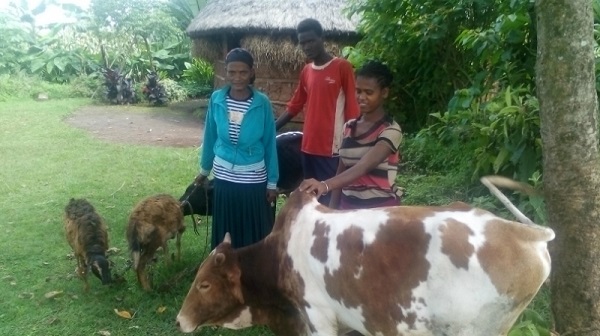
(International Medical Corps UK)–The lowest point came when her children dropped out of school, their time dominated with the need to forage for wild cabbage to keep the family from starving.
For 55 year old Bekelech, the situation looked bleak – widowed by the sudden death of her husband, lacking the funds to buy the fertilizer and seeds she needed to cultivate her tiny farmstead in Boloso Sore woreda in southwestern Ethiopia and forced to sell her two cows in desperation, she was aware that both she, and her sons and daughters, were living on the very edge of survival.
“I would try to get loans from money lenders to manage my farm lands but because I was so poor and I had no guarantor, they would not lend me money,” Bekelech recalls.
In this time of desperation, she turned to International Medical Corps’ team working on the ground in the country and was made aware of their resilience building projects – work provided through humanitarian aid from the European Union.
It was the start of a journey that would completely transform the family’s lives.
A neighborhood development agent began visiting their farm, which covers less than a third of an acre, to provide support and guidance, while Bekelech was provided with two days of training around integrated agricultural farming – focusing on the essentials needed to diversify her revenue-generating efforts and increase the productivity of her land at the same time.
Soon afterwards she received three sheep and 200 kilograms of Irish potato seeds, becoming one of the over seven hundred household farmers who would receive such support in 2014.
A determined woman, Bekelech’s plans to build a thriving potato farm took another step forward when she was persuaded by International Medical Corps to become a member of a rural saving and credit cooperative – providing her with access to fund farm management and income-generating activities. She obtained a loan for 300 birr – roughly £11 – which she used to buy fertilizers.
Her first harvest was a great success: her 200 kilograms of seeds, fertilized and lovingly tended by the family, produced nearly 1500 kilograms of Irish potatoes – a yield roughly three times what local seeds would have produced in the same conditions. Bekelech, ever the perfectionist, cursed bad luck from preventing even higher results.
“It could probably have reached 1800 kilograms if my field hadn’t been affected by pests,” she says ruefully.
Regardless, the crop was a turning point for the family. They sold 1000 kilograms, keeping the rest to eat themselves, and with the profits bought a cow and her calf with plans to breed from them. The rest of their earnings were used to pay off the original loan and most importantly – the children returned to school. On top, her livestock continued to grow: two sheep gave birth to lambs, their sale and some savings lead to the purchase of a bull and four chickens.
Today, Bekelech has one ox, two cows, five sheep and seven hens. Her farm has recently been planted with maize, with the family holding high hopes of another strong crop in the coming months. While she is incredibly proud of the small business she built, the 55-year-old says her greatest achievement has been sending her children back to school.
“I have given them a bright future because they are being educated,” she explains with a smile.
“I learned farming when I was a child, but it took the help of International Medical Corps to give me the confidence to generate sustainable income and pull my family out of poverty.”
Source: International Medical Corps UK
——
See also:
- Ethiopia: Surviving Hard Times through Therapeutic Foods
- USAID Provides School Supplies for Students in Drought Affected Areas
- Growth Through Nutrition: New Multi-Sector Nutrition Activity Launched
- Former Minister of Health Kesetebirhan Admasu Appointed as CEO of Roll Back Malaria
- EPHI: Annual Review Meeting Held on the Ethiopian Guinea-worm Disease Eradication Program
